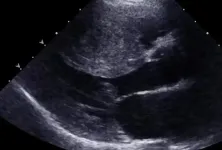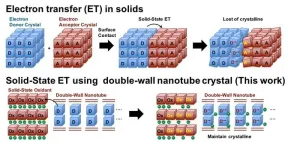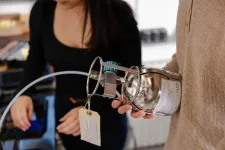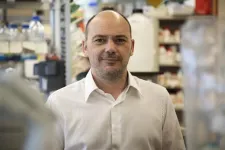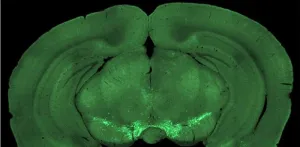(Press-News.org) DALLAS, June 4, 2024 — Significant barriers prevent or slow treatment for many patients with stroke, including long travel times to stroke center hospitals and the lack of availability of stroke specialists who can evaluate the patient and determine if they are a candidate for treatment.[1] Telehealth stroke care, also known as telestroke, can expand access to rural areas and other communities that face barriers to stroke care.
A new American Heart Association certification for health care professionals is designed to help standardize training and increase skills and competencies for health care providers in telehealth stroke care delivery, as well as help improve stroke outcomes through the integration of telehealth. This is the third individual certification available through the American Heart Association’s best-in-class, science-based certification portfolio.
An estimated 9.4 million Americans ages 20 and older have had a stroke, and stroke accounts for about 1 of every 19 deaths in the United States.[2] Stroke is a leading cause of serious long-term disability in the United States. And the problem is only getting worse — projections show a 20.5% increase in stroke prevalence by 2030.[3]
Telehealth stroke care uses interactive videoconferencing to provide specialists timely data to assist clinicians at the bedside in stroke-related decision-making for people seeking care at distant facilities that do not have a stroke neurologist available around the clock.
“Timely access to the latest therapies through expanded use of telehealth-enabled stroke care has been shown to greatly improve the quality of care and reduce disability from stroke, especially in areas with fewer neurologists and stroke experts,” said Lee Schwamm, M.D., FAHA, volunteer member of the American Heart Association Center for Telehealth Expert Panel; senior vice president and chief digital health officer of Yale New Haven Health; and associate dean of digital strategy and transformation at Yale School of Medicine. “The American Heart Association’s individual telehealth stroke certification is a way for health care professionals to ensure they are providing the highest quality of care and leveraging this evolving delivery modality to its fullest potential.”
The new telehealth individual certification, supported by the Leona M. and Harry B. Helmsley Charitable Trust, is available through the Association’s Professional Education Hub™. The certification is an offering of the American Heart Association Center for Telehealth.
The certification is open to licensed medical professionals who complete prerequisite education. The certification process features:
high-quality, evidence-based online telehealth stroke education that combines research, hands-on experiences and best practices;
assessment delivery via live remote-proctoring, certification award and renewal via American Heart Association platforms; and
individual promotional opportunities by display of personalized certificate award and credentials, which are good for three years.
Additional Resources:
Spanish news release
New telehealth certification available to health care professionals | American Heart Association
Telehealth | American Heart Association
Telestroke Fact Sheet (heart.org)
###
About the American Heart Association
The American Heart Association is a relentless force for a world of longer, healthier lives. We are dedicated to ensuring equitable health in all communities. Through collaboration with numerous organizations, and powered by millions of volunteers, we fund innovative research, advocate for the public’s health and share lifesaving resources. The Dallas-based organization has been a leading source of health information for a century. During 2024 - our Centennial year - we celebrate our rich 100-year history and accomplishments. As we forge ahead into our second century of bold discovery and impact our vision is to advance health and hope for everyone, everywhere. Connect with us on heart.org, Facebook, X or by calling 1-800-AHA-USA1.
About The Leona M. and Harry B. Helmsley Charitable Trust
The Leona M. and Harry B. Helmsley Charitable Trust aspires to improve lives by supporting exceptional efforts in the U.S. and around the world in health and select place-based initiatives. Since beginning active grantmaking in 2008, Helmsley has committed more than $4.5 billion for a wide range of charitable purposes. Helmsley’s Rural Healthcare Program funds innovative projects that use information technologies to connect rural patients to emergency medical care, bring the latest medical therapies to patients in remote areas, and provide state-of-the-art training for rural hospitals and EMS personnel. To date, this program has awarded more than $600 million to organizations and initiatives in the states of Iowa, Minnesota, Montana, Nebraska, Nevada, North Dakota, South Dakota, and Wyoming. For more information, visit https://helmsleytrust.org/.
[1] Jauch EC, et al. Recommendations for regional stroke destination plans in rural, suburban, and urban communities from the prehospital stroke system of care consensus conference. Stroke. 2021 52(5), e133-e152.
[2] Chapter 15. Heart Disease and Stroke Statistics—2024 Update: A Report From the American Heart Association. January 24, 2024. Circulation. 2024;149:e347–e913. https://www.ahajournals.org/doi/10.1161/CIR.0000000000001209.
[3] Ibid.
END
New telehealth stroke certification available to health care professionals
Clinicians can demonstrate their commitment to expanding, maintaining equitable stroke care through this American Heart Association certification for individuals
2024-06-04
ELSE PRESS RELEASES FROM THIS DATE:
Allen Institute for Cell Science launches first disease-specific cell line collections
2024-06-04
By Jake Siegel
Seattle, WASH.—June 4, 2024—The Allen Institute for Cell Science unveiled a set of tools to accelerate research into hypertrophic cardiomyopathy (HCM), the most common genetic heart condition in the world: six new cell line collections, each carrying a different mutation associated with HCM.
HCM is primarily caused by mutations that thicken heart muscle and, in rare cases, lead to heart failure and cardiac arrest. The new cell line collections will help scientists investigate ...
Towards next-gen functional materials: direct observation of electron transfer in solids
2024-06-04
Electron transfer (ET) is a process in which an electron is transferred from one atom or molecule to another. ET is fundamental to electrochemical reactions with applications in many fields. Nanoscale ET, which involves the transfer of electrons in the range of 1–100 nanometers in solids is fundamental to the design of multifunctional materials. However, this process is not yet clearly understood.
Nanotubes, nanomaterials with unique cylindrical nanostructures, offer a variety of ET properties that can be realized through electron and hole (vacant spaces left by electrons) injections into the nanotubes, making them a suitable candidate for studying nanoscale ET. Although ...
How stress knocks out your cognitive reserve
2024-06-04
While mentally stimulating activities and life experiences can improve cognition in memory clinic patients, stress undermines this beneficial relationship. This is according to a new study from Karolinska Institutet published in Alzheimer’s & Dementia: The Journal of the Alzheimer’s Association.
Researchers in the late 1980s found that some individuals who showed no apparent symptoms of dementia during their lifetime had brain changes consistent with an advanced stage of Alzheimer’s disease. It has since been postulated that so-called ...
New study confirms presence of benzene in natural gas and potential for undetectable indoor leaks
2024-06-04
OAKLAND, CA – New research finds that even people with an average sense of smell could be living with a natural gas leak and not know it. The peer-reviewed study, published in Environmental Research Letters, finds that small gas leaks can impact indoor air quality by introducing a number of hazardous air pollutants, including the carcinogen benzene, which researchers found in 97% of natural gas samples across North America.
“While these smaller leaks are not large enough to cause gas explosions, hard-to-smell leaks are common,” ...
Allergy or infection? Scientists discover what distinguishes these two immune system responses
2024-06-04
The production of antibodies, essential for protecting our body against infections, is very well regulated through the action of a specific subtype of immune system cells, follicular helper lymphocytes. Now, a team led by Luís Graça, group leader at the Instituto de MedicinaMolecular João Lobo Antunes (iMM) and Professor at the Faculty of Medicine of the University of Lisbon, has dedicated itself to the detailed characterization of the functioning of these cells, in an article published today in the prestigious ...
Study reveals high rate of drowsy driving by teens
2024-06-04
DARIEN, IL – A new study to be presented at the SLEEP 2024 annual meeting found that drowsy driving by teenagers is a common threat to public safety on U.S. roadways.
Results of the National Sleep Foundation study show that approximately one in six adolescent drivers reported having driven drowsy. Based on these responses, the authors project that 1.7 million teenage drivers have driven drowsy, and more than 400,000 teens drive drowsy at least once per week. The majority of teens pointed to work or ...
Hypoxemia due to sleep apnea is associated with risk of lung cancer reoccurrence
2024-06-04
DARIEN, IL – A new study to be presented at the SLEEP 2024 annual meeting is the first to find that episodic hypoxemia and hypoxic burden related to obstructive sleep apnea are associated with the risk of accelerated lung cancer reoccurrence.
Results show that a 4% oxygen desaturation index of more than 15 and time spent in desaturation events were risk factors for cancer reappearance in less than two years. Measures of hypoxic burden such as time spent below 89% oxygen saturation, average oxygen saturation value below 89%, and single nadir oxygen levels, showed a similar association. After adjustment for potential confounders, average oxygen saturation below 89% and single minimum ...
Getting more sleep leads to increased gratitude, resilience and flourishing
2024-06-04
DARIEN, IL – A new study to be presented at the SLEEP 2024 annual meeting found that healthy sleep has a positive impact on gratitude, resilience and flourishing in adults.
Results show that subjective sleepiness and mood disturbances improved with earlier bedtimes that extended sleep by an average of 46 minutes per night and worsened with later bedtimes that reduced nightly sleep by an average of 37 minutes. Measures of flourishing, resilience and gratitude significantly improved across the week with sleep extension and significantly worsened with sleep restriction. Sleep-extended ...
Smart thermostats provide sleep insights at home
2024-06-04
DARIEN, IL – A new study to be presented at the SLEEP 2024 annual meeting offers a framework for an objective, non-invasive and zero-effort sleep monitoring system utilizing smart thermostats equipped with motion sensors.
Results show that smart thermostats identified three distinct sleep quality clusters, with clear variations in sleep duration, disturbances and efficiency. Comparative analysis underscored the heterogeneity in sleep quality, highlighting the potential of smart devices and NextGen IoT data sources in identifying sleep patterns and contributing to sleep research ...
Decoding self-initiative: How the brain governs goal-directed actions
2024-06-04
Ever wondered how your brain decides when to act? Initiating actions with a specific goal in mind is a complex process. Previous research has identified certain parts of the brain and chemical signals involved. However, it remains unclear what information these signals convey and how they spark initiative.
Recent research reported in Neurophotonics dives into this mystery by investigating how mice time their actions in pursuit of rewards, exploring the role of a specific brain pathway called the mesocortical pathway, in the context of self-initiated ...
LAST 30 PRESS RELEASES:
Exercise and nutritional drinks can reduce the need for care in dementia
Michelson Medical Research Foundation awards $750,000 to rising immunology leaders
SfN announces Early Career Policy Ambassadors Class of 2026
Spiritual practices strongly associated with reduced risk for hazardous alcohol and drug use
Novel vaccine protects against C. diff disease and recurrence
An “electrical” circadian clock balances growth between shoots and roots
Largest study of rare skin cancer in Mexican patients shows its more complex than previously thought
Colonists dredged away Sydney’s natural oyster reefs. Now science knows how best to restore them.
Joint and independent associations of gestational diabetes and depression with childhood obesity
Spirituality and harmful or hazardous alcohol and other drug use
New plastic material could solve energy storage challenge, researchers report
Mapping protein production in brain cells yields new insights for brain disease
Exposing a hidden anchor for HIV replication
Can Europe be climate-neutral by 2050? New monitor tracks the pace of the energy transition
Major heart attack study reveals ‘survival paradox’: Frail men at higher risk of death than women despite better treatment
Medicare patients get different stroke care depending on plan, analysis reveals
Polyploidy-induced senescence may drive aging, tissue repair, and cancer risk
Study shows that treating patients with lifestyle medicine may help reduce clinician burnout
Experimental and numerical framework for acoustic streaming prediction in mid-air phased arrays
Ancestral motif enables broad DNA binding by NIN, a master regulator of rhizobial symbiosis
Macrophage immune cells need constant reminders to retain memories of prior infections
Ultra-endurance running may accelerate aging and breakdown of red blood cells
Ancient mind-body practice proven to lower blood pressure in clinical trial
SwRI to create advanced Product Lifecycle Management system for the Air Force
Natural selection operates on multiple levels, comprehensive review of scientific studies shows
Developing a national research program on liquid metals for fusion
AI-powered ECG could help guide lifelong heart monitoring for patients with repaired tetralogy of fallot
Global shark bites return to average in 2025, with a smaller proportion in the United States
Millions are unaware of heart risks that don’t start in the heart
What freezing plants in blocks of ice can tell us about the future of Svalbard’s plant communities
[Press-News.org] New telehealth stroke certification available to health care professionalsClinicians can demonstrate their commitment to expanding, maintaining equitable stroke care through this American Heart Association certification for individuals
